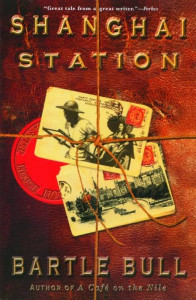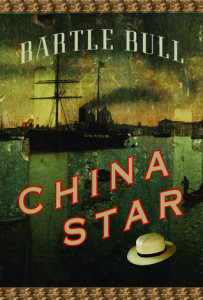 If I fall asleep while I’m reading a Bartle Bull novel, I know am really, seriously tired! His writing keeps me awake and engaged, sometimes to the point that I can’t easily fall asleep – even when I am trying to – after a session with one of his books. I ran across The Café on the Nile, the middle book from Bull’s earlier trilogy (which also includes The White Rhino Hotel and The Devil’s Oasis), at a used bookstore some years ago. I have been a fan ever since.
If I fall asleep while I’m reading a Bartle Bull novel, I know am really, seriously tired! His writing keeps me awake and engaged, sometimes to the point that I can’t easily fall asleep – even when I am trying to – after a session with one of his books. I ran across The Café on the Nile, the middle book from Bull’s earlier trilogy (which also includes The White Rhino Hotel and The Devil’s Oasis), at a used bookstore some years ago. I have been a fan ever since.
Bull is an American of British ancestry. A member of the Royal Geographical Society and the Explorers’ Club, he has traveled widely in the parts of the world he writes about. He is also very conscientious in carrying out historical research, using primary sources such as newspapers of the period. One of the characteristics of his writing that I especially admire is his meticulous attention to detail (in qualitative research methods, we call it “thick description”). I have vivid memories of treks through the Abyssinian highlands and forays across the North African desert from the earlier series. From these two books, I have intense sensory images of Shanghai as it must have smelled and sounded and felt in the early years of the 20th century.
That intensity of experience has its downsides, if you are a sensitive reader. All of Bull’s books are rife with violence and eroticism, often as not intermingled in the same scenes. He also has a tendency to use strong imagery to describe cultural practices. In these two novels, for example, he dwells extensively and at length on the Chinese custom of foot binding. In many respects, these books suggest what The Indiana Jones Chronicles might have looked like if they had been R-rated. About the only R-rated element missing from Bull’s narratives – and I mean completely missing – is crude or obscene language.
Unlike the earlier trilogy, which had multiple protagonists, both Shanghai Station and China Star feature a single main character, a young man named Alexander Karlov. At the start of Shanghai Station, which opens in September 1918, Alexander is a 17-year-old cadet, called home from his training academy in the wake of the Bolshevik Revolution, which immediately placed the lives and properties of his family and the other so-called White Russians (opponents of the communist Bolsheviks, also known as the Reds) in grave peril. With his mother, his twin sister Katerina, and one devoted servant, Alexander takes off on the Trans-Siberian Express to rendezvous with his father in Vladivostok. A band of marauding Reds ambushes the train. A particularly evil Red Commissar kills Alexander’s mother and abducts his sister. Before he leaves, he engages Alexander in a fight, causing the young man to suffer a leg break so severe that it permanently affects his gait, and his ability to fence and ride horseback, two activities that define Alexander’s personality.
Shanghai Station is first and foremost a coming-of-age novel. The main plotline concerns Alexander’s reunion with his father, whom he scarcely knows; their journey by boat down to Shanghai in the company of three hundred White Russian soldiers, all fleeing the Reds; and their efforts to make a new life in a very strange new place. Both father and son are motivated by the need to survive and the desire to avenge the brutal death and abduction of their female family members. In an old opium warehouse, they establish a riding, fencing and swordsmanship club that quickly becomes a gathering place for many of the White Russian émigré community in Shanghai. Always chivalrous and a bit of a show-off, Alexander defends and befriends an elderly Chinese madam and through her becomes associated with the notorious leader of one of the local gangs.
 The plot of China Star wraps around a long journey, in both a literal and figurative sense, that occurs about four years after the first novel ends. At the start, Alexander, now 22, is in Paris, another gathering place for the White Russian émigrés, looking for clues to the whereabouts of his sister. He travels back to Shanghai on the China Star, a classic steamer of the P & O Line, otherwise known as the Peninsular & Oriental Steam Navigation Company.
The plot of China Star wraps around a long journey, in both a literal and figurative sense, that occurs about four years after the first novel ends. At the start, Alexander, now 22, is in Paris, another gathering place for the White Russian émigrés, looking for clues to the whereabouts of his sister. He travels back to Shanghai on the China Star, a classic steamer of the P & O Line, otherwise known as the Peninsular & Oriental Steam Navigation Company.
Of course traveling to Shanghai, on the east coast of China, from Paris by steamer is a long, long journey, and Alexander has lots of adventures. Like many of the White Russians, he is a target for assassination by the Reds. During the course of this novel, he successfully eludes or foils several attempts on his life and the lives of his traveling companions. He also falls in love with a married, older woman, an intellectual who seems to have a very healthy libido. Once she gets past her initial concerns about other people’s opinions, she is very easily able to keep up with Alexander’s youthful enthusiasm. I found myself wondering what positions they used for their activities, since Alexander couldn’t bend his left knee!
There is no connection at all between Shanghai Station and the earlier Bull trilogy. With China Star, however, Bull takes advantage of the time and space coincidence to introduce a major character from those books, the devious Goan dwarf Olivio Fonseca Alavedo, whom Alexander defends and befriends in much the same way he did the Chinese madam in Shanghai Station, and with much the same highly beneficial results. Because only the last few chapters of China Star take place in Shanghai, many of the characters from the first book are absent except by reference for most of this one.
Bull makes it clear throughout these books that his sympathies lie with the White Russians and not with the Reds, whom he repeatedly characterizes as savage murderers and rapists. Most of the fiction I’ve read about this period was written by Red sympathizers, so this is a new perspective for me, and one I had to take with a grain or two of salt. If nothing else, Bull reminded me that the story is not a simple one to untangle.
Shanghai Station and China Star are definitely parts of the same story. Whether Bull intends to write a third installment I cannot say. He didn’t leave a lot of dangling plot threads at the end of China Star, but I don’t recall that he did so with the middle book in the earlier trilogy, either. Bull isn’t getting any younger, and he doesn’t appear to depend on the income from these novels to support his lifestyle. I will keep watching Amazon for new works – I just have to remember that his son, also a writer, is named Bartle Bull, as well.
(Carroll & Graf, 2004)
(Carroll & Graf, 2006)
